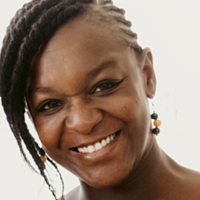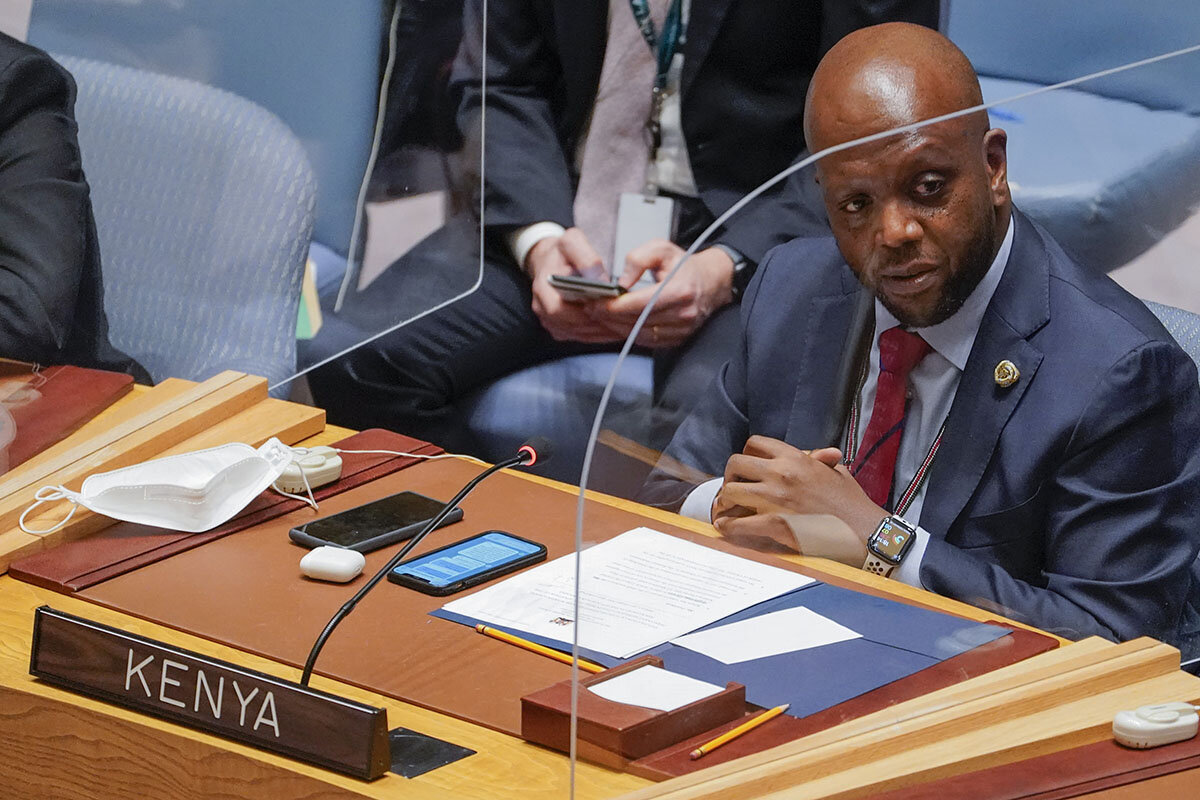The West has united against Putin’s war. Not Africa.
Loading...
| Johannesburg
When the United Nations General Assembly voted by an overwhelming majority last month to call for an end to the Russian invasion of Ukraine, half of the 35 countries that abstained – refusing to condemn Moscow – were from Africa, and another seven African representatives did not show up for the vote.
Russia has been quietly strengthening its ties with Africa in recent years, building on residual gratitude for the help that the Soviet Union once gave to anti-colonial movements across the continent. And Moscow has found fertile ground in a number of countries in the region.
Why We Wrote This
A significant number of African countries have refused to condemn Russia’s invasion of Ukraine. Their reservations have roots in the colonial era – and in contemporary arms deals.
“There’s an element of supporting Russia as a counterbalance to what is seen as American hegemony or hypocrisy on a range of issues,” says a former Nigerian government adviser.
On top of that, many African rulers depend on Moscow for their weapons: Russia is the largest supplier of arms to the continent, and specializes in deals with governments that Western manufacturers boycott on human rights grounds.
Old loyalties can run deep. Linda John Selepe, a former South African freedom fighter, learned to fly military jets in the Soviet Union. More than 30 years later, he says, nothing that has happened has “changed my attitude and belief in the Russian people.”
When Linda John Selepe, a 68-year-old South African veteran, first saw images of Russian aircraft flying over Ukraine, he was immediately taken back to a time when he, too, had lived with Soviet-era bomber jets roaring overhead.
In the 1980s, barely out of his teens, Mr. Selepe took up arms in the struggle to overthrow South Africa’s white-minority government, spending years in bare-bones bush camps. There, he received training, weapons, and financial support from Moscow, which supported dozens of independence movements in Africa as part of their Cold War rivalry with the West.
“The only way we could survive – the only way we did survive – was the Russian aircraft coming to bomb” enemy positions, Mr. Selepe says of his years as a guerrilla fighter operating from neighboring Angola, his voice still emotional four decades later.
Why We Wrote This
A significant number of African countries have refused to condemn Russia’s invasion of Ukraine. Their reservations have roots in the colonial era – and in contemporary arms deals.
“I feel pity and sympathy for the civilians of Ukraine. But I fully support Putin’s actions in Ukraine, based on my history.”
Such legacies are still playing out across the continent today, and help explain why many African states have been reluctant to publicly criticize Russia’s aggression in Ukraine.
African ambivalence was on show at a U.N. General Assembly meeting on March 2. An overwhelming majority of 141 nations voted in favor of a resolution demanding the immediate withdrawal of Russian forces from Ukraine. But of the 35 countries that abstained from condemning Russia, 17 were from Africa. A further seven African representatives did not record a vote at all. Eritrea, a secretive rogue state in east Africa, joined Belarus, North Korea, Syria, and Russia in voting against the resolution.
“Many African countries are sitting on the fence for a number of reasons,” says Steven Gruzd, an expert on African governance and diplomacy at the South African Institute of International Affairs. They include “not wanting to become embroiled in a new Cold War, empathy with Russia and antipathy towards the West, and diplomatic and political calculations.”
A counterbalance
U.N. General Assembly resolutions aren’t legally binding, but they do carry political weight – and the March 2 vote sent important signals about a shifting international order.
Russia has been quietly strengthening ties with African states in recent years, particularly on the military front. Military leaders from the Central African Republic, Mali, Guinea, and Sudan, among others, have invited Russian mercenaries to tackle unrest, often despite already receiving military or economic aid from the West.
The Central African Republic has said it planned to make Russian language classes compulsory for all undergraduates. Supporters of a military coup in Burkina Faso earlier this year brandished Russian flags.
And, on the day Russia launched its invasion of Ukraine, South Africa’s minister of defense attended an official cocktail party at the Russian embassy celebrating Russian Motherland Defenders’ Day.
“There’s an element of supporting Russia as a counterbalance to what is seen as American hegemony or hypocrisy on a range of issues,” says a former Nigerian government adviser.
Such issues range from a lack of U.S. accountability over its invasion of Iraq to meddling in local politics, the adviser says. “America has taken on a caricature of decadence, immorality, hypocrisy, an international bully. Russia, by contrast, through savvy media manipulation, appears as the underdog.”
That view is also popular in southern Africa. “Zimbabweans have been victims of unilateral sanctions for over 20 years and would not wish this on anyone,” Zimbabwe’s foreign minister said, in a statement explaining why the country had abstained from criticizing Russia.
Guns and nukes
But some of the fence-sitting is down to hard-nosed realpolitik.
Russia’s strategy on the continent involves pursuing deals with elites, rather than states, points out Joseph Siegle, director of research at the U.S. Defense Department’s Africa Center for Strategic Studies. “By helping these often illegitimate and unpopular leaders to retain power, Russia is cementing Africa’s indebtedness to Moscow,” he notes.
And although Russia’s overall trade with Africa is minuscule, Moscow is the continent’s biggest arms supplier, in a market where Western manufacturers are constrained by human rights concerns. Russia is threatening “unfriendly countries” with sanctions, and African leaders “don’t want to cut off that access to Russian armaments,” says the Nigerian official, who asked to remain anonymous because he is not authorized to speak to the press.
Russia’s attempt to leverage the legacy of Soviet-era ties played out in a particularly unusual way in South Africa, the continent’s most developed nation.
“Russia has always seen South Africa as a gateway to expand influence in the West more broadly,” says David Fig, an environmental sociologist at the University of Cape Town who has written about Russian energy geopolitics. “One of the ways it seeks to do that is through clandestine relationships supporting [South Africa’s] energy infrastructure.”
That came to a head under Jacob Zuma, the outspoken former president who reportedly received training in the Soviet Union during the apartheid years. In 2015, Mr. Zuma attempted to sign an unconstitutional $76 billion deal with Rosatom, the nuclear power company controlled by a Kremlin oversight board, to build a number of nuclear power stations.
The proposal made no economic sense to technocrats at Rosatom, but Mr. Putin lobbied for it on geopolitical grounds, a report released by the Carnegie Endowment for International Peace later concluded. Mr. Zuma himself fired three finance ministers in four days because they refused to sign off on the highly secretive pact. The deal was eventually scuppered by South African courts in April 2017.
Understanding Putin
As Ukrainian civilian casualties mount, and evidence suggesting Russian war crimes comes to light, will hesitant African states speak out more forcefully against Russia?
That is unlikely, predicts Linda Chisholm, a professor at the University of Johannesburg, who has written about how the Cold War is taught and interpreted in South Africa. “If anything, I think positions are hardening,” she says. “I think sides are chosen in terms of local politics, so positions on Russia and Ukraine become a tool in local politics to define where you stand.”
Russia is not the Soviet Union, nor does it offer any ideological message today. But among some people, such as Mr. Selepe, old loyalties die hard.
For Mr. Selepe, the former guerrilla fighter, the bombed out ruins of apartment blocks in Ukraine tell only one side of the story.
Still affectionately referred to by his guerrilla alias, “Sporo,” meaning “railway,” in Zulu, Mr. Selepe was born in 1963, at a time when the Soviet Union was almost the only country willing to offer extended support to those fighting in the anti-apartheid struggle.
Mr. Selepe spent four years in bush camps, transporting supplies to cadres, carrying out cross-border raids and escaping ambushes launched by proxy militias. In 1987, he was flown to the Soviet republic of Kirghizia, where he spent another four years learning how to fly jets in preparation for an existential battle back home.
“For me personally, the Union of Soviet Socialist Republics, it is Russia, and Moscow is the head,” Mr. Selepe says. “Whatever happened with all these countries that got their independence, it didn’t change my attitude and belief in the Russian people.”
Shortly after he returned to Africa, apartheid collapsed, in 1994. Mr. Selepe was integrated into a South African air force that was racially mixed for the first time. His training abroad, he says, meant he had more knowledge and skills than many of the white officers who had once been his sworn enemies.
Almost every Sunday morning since the war broke out, Mr. Selepe has left his home in a tidy Johannesburg suburb, turned a corner, then walked a few hundred yards until he reaches a gold-domed Russian Orthodox church. There, he says, he nods along to the liturgy, delivered entirely in Russian, and offers prayers for both Russian and Ukrainian citizens.
Returning home, he settles down to watch the relentless news from Ukraine. “When Putin is speaking on television,” he says, “I don’t read the captions. I just follow what he’s saying. I understand all of it.”









